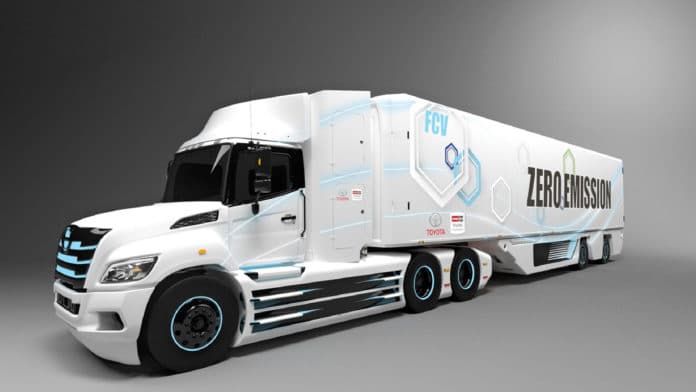Japanese automaker Toyota and Hino USA have officially announced that they will jointly develop a Class 8 fuel cell electric truck (FCET) for the North American market that will offer heavy-duty capacity and clean emissions. The first prototype is slated for the first half of 2021.
The companies will leverage the newly developed Hino XL Series chassis with Toyota’s proven fuel cell technology to deliver exceptional capability without harmful emissions. This project follows another agreement between Toyota and Hino announced in March to develop a 25-tonne hydrogen-powered truck for the Japanese market.
“A fuel cell-powered version of the Hino XL Series is a win-win for both customers and the community. It will be quiet, smooth, and powerful while emitting nothing but water,” said Tak Yokoo, Senior Executive Engineer, Toyota Research and Development. “Toyota’s twenty-plus years of fuel cell technology combined with Hino’s heavy-duty truck experience will create an innovative and capable product.”
“Expanding upon our proud heritage of the Hino powertrain, Toyota Fuel Cell Technology offers our customers a commercially viable, extended range, the zero-emissions vehicle in the near term,” said Glenn Ellis, Hino’s Senior Vice President Customer Experience. “Hino shares a common focus with Toyota when it comes to durability, reliability, and innovation with the customer at the center of the design, which makes this collaboration a game-changer.“
While the hydrogen car market remains in its infancy, particularly due to the lack of adequate infrastructure, fuel cell electric trucks and buses could well lead the way, say industry analysts. Because these vehicles generally have predictable routes, which could greatly facilitate the installation of hydrogen stations on their routes.
One of the world pioneers of fuel-cell cars with its Mirai model, Toyota has also been involved in a pilot project for hydrogen trucks. It has been developing hydrogen fuel cell trucks through Project Portal since 2017, and later in 2018, Project Portal 2.0 developed a hydrogen fuel cell trailer. It is combined with two hydrogen fuel stacks, a 12-kilowatt-hour battery, 670 horsepower, 1,325 lb-ft of torque, could handle 80,000 lb (36,87 kg) of total weight and 300 miles (482 km) range.
Other major automotive groups, such as General Motors, Daimler, Volvo, Hyundai, are increasingly interested in the emerging market for heavy-duty hydrogen vehicles, which do not cause CO2 emissions, while environmental regulations in Europe and California, in particular, are becoming more stringent.
